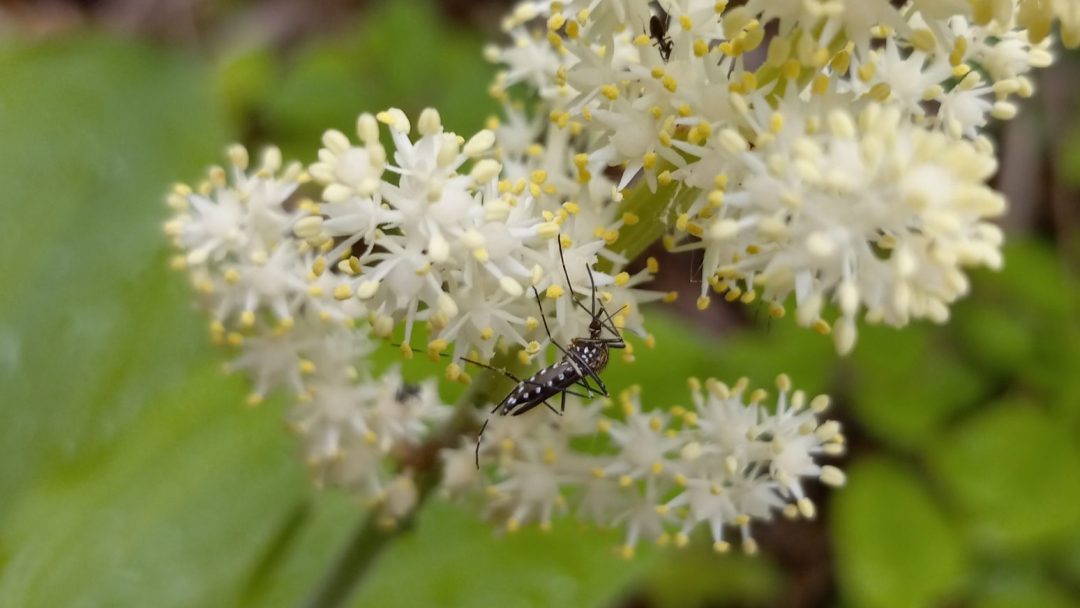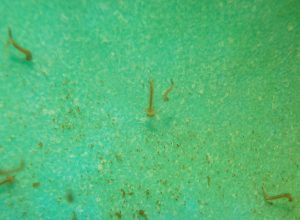Mosquitoes: Deadly Pests or Ecological Wonders?

It’s a scene you’re likely familiar with: you’ve reached the trailhead, and are ready to embark on a lovely hike in late May or early June. The sun is shining, so you’ve picked a shady, cool area to hike in. As soon as you step out onto the trail, you hear their signature humming, and within minutes you are surrounded by a cloud of bloodthirsty insects.
Mosquitoes: Deadly Pests or Ecological Wonders?
If you’ve spent any time in the swamps and forests of Ontario in late spring and early summer, you know mosquitoes well. These insects are infamous for causing discomfort ranging from itchy bites to deadly diseases. However, is that all mosquitoes have to offer? You may be surprised to learn that mosquitoes have important ecological roles and provide more to humans and the ecosystems they live in than itchy bites.
One of the more well-known ecological roles of mosquitoes is pollination. Male mosquitoes in particular feed mainly on nectar, thereby pollinating many plant species (Rafferty, 2022). Additionally, mosquitoes are an important source of food for many predators. In fact, since adults are terrestrial and their larvae are aquatic, mosquitoes provide food for both types of ecosystems. Hundreds of species of fish, birds, amphibians, and mammals rely on mosquitoes to supplement their diet (2022). This contribution may be so significant that mosquito control measures can have visible effects on other species. For example, mosquito control measures in the Carmague region of France were associated with a 25% decrease in breeding success of the house martin, a type of insectivorous bird (Poulin et al., 2010).

Since the mosquito life cycle is split between aquatic and terrestrial stages, mosquitoes also contribute to ecosystem connectivity. When adult mosquitoes emerge from their aquatic nurseries, they carry the biomass they accumulated from feeding on algae and aquatic organic matter out into the surrounding terrestrial ecosystem. As terrestrial predators feed on them, this biomass is further incorporated and enhances the connectivity between these ecosystems (Peach, 2019). In fact, their bloodsucking behaviour is an important part of this role. Mammal and bird blood provides female mosquitoes with the nutrients they need to produce eggs. Since mosquito eggs must be laid in or near water so that the aquatic larvae can survive, this behaviour transfers energy back from the terrestrial ecosystem to the aquatic ecosystem (Hawkes & Hopkins, 2022).
Furthermore, while mosquito control strategies may target mosquitoes indiscriminately, most mosquito species rarely feed on humans. Even among mosquito species that do feed on humans, most will happily utilize other mammals if they are more prevalent (Hawkes & Hopkins, 2022). Furthermore, mosquito control strategies can be harmful to other important insects. Bug zappers, a common tool used by the public for mosquito control, are often ineffective at controlling mosquitoes while being highly effective at killing many other harmless species. Bug zappers can attract and kill hundreds of moths, which are essential pollinators in many ecosystems. Meanwhile, mosquitoes, which are attracted to carbon dioxide and the smells produced by mammals (rather than lights), are largely unaffected. Bug zappers also kill many parasitoid wasps, which are harmless to humans but essential in controlling the populations of common insect pests, such as beetles and aphids (Mahoney, 2019).
The fact remains that mosquitoes can be both annoying and deadly. However, there is so much more to these fascinating insects than their bloodthirsty reputation may lead you to believe. From pollination to biomass transfer, mosquitoes play important roles in the ecosystem that should be respected like any other species.
How to deter mosquitoes effectively
The best strategies for controlling mosquitoes are those that deter them, without harming the ecosystem in the process. Bug spray is an effective tool for this, as it causes mosquitoes to avoid you without harming them or other insects. Electric fans are another effective tool. Mosquitoes are weak flyers, and so maintaining a light draft in an outdoor area where you are spending time can successfully keep them away without hurting important pollinators (Mahoney, 2019).
Fun Mosquito Facts:
- The largest mosquito species, Toxorhynchites speciosus, has a wingspan four times larger than most mosquitoes. However, this species does not feed on blood! Instead, its larvae get their necessary nutrients by predating on live prey, including other mosquito larvae (Hawkes & Hopkins, 2022).
- There are over 3,500 species of mosquito on Earth. Ontario is home to 67 species, 9 of which are endemic (Giordano et al., 2015; Hawkes & Hopkins, 2022).
- Mosquitoes use an organ called the Johnston’s organ to detect sounds. This organ is the most sensitive sound-detecting organ found in insects (Hawkes & Hopkins, 2022).
- Certain mosquito species have been found to feed on animals as varied as frogs, mudskippers, worms, leeches, and triggerfish (Hawkes & Hopkins, 2022).
References:
Giordano, B. V., Gasparotto, A., & Hunter, F. F. (2015). A checklist of the 67 mosquito species of Ontario, Canada. Journal of the American Mosquito Control Association, 31(1), 101–103. https://doi.org/10.2987/14-6456r.1
Hawkes FM, Hopkins RJ. The mosquito: An introduction. In: Hall M, Tamïr D, editors. Mosquitopia: The Place of Pests in a Healthy World [Internet]. New York: Routledge; 2022. Chapter 2. Available from: https://www.ncbi.nlm.nih.gov/books/NBK585164/# doi: 10.4324/9781003056034-3
Mahoney, D. (2019, August 14). Do bug zappers work? yeah-about as well as any other indiscriminate wildlife slaughter. The New York Times. https://www.nytimes.com/wirecutter/blog/do-bug-zappers-work/
Peach, D. A. H. (2019, December 2). The bizarre and ecologically important hidden lives of mosquitoes. The Conversation. https://theconversation.com/the-bizarre-and-ecologically-important-hidden-lives-of-mosquitoes-127599
Nature Stories